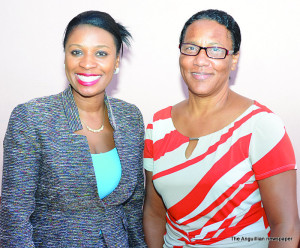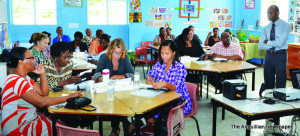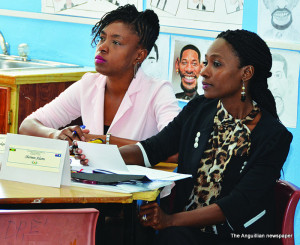
Senior and Middle Management Teams at the Abena Lake-Hodge Comprehensive School in Anguilla have benefitted from five days of leadership training.
The training was delivered in a partnership involving Anguilla’s Ministry and Department of Education and the National College of Educational Leadership in Jamaica.
Permanent Secretary in the Ministry of Education in Anguilla, Mrs. Chanelle Petty Barrett, put the training in perspective in a message printed in the booklet which outlined the course. “Research demonstrates that leadership is second only to classroom instruction among all school-related factors that contribute to student learning,” she stated. “As such, it is not only appropriate, but prudent that we provide opportunities for school leaders to further develop leadership capacity and support their growth.”

Mrs. Petty Barrett gave the following advice to the Senior and Middle Management Teams of the school: “As leaders, you are change managers. It is your role to be at the forefront of the change process in your school, department or unit – and to ensure that those you lead are adequately prepared to competently handle the existing job requirements and what will become the new norm. You have to take the lead in setting the goals, influencing others to work towards those goals and creating an environment that enables goal achievement. The impacts of globalisation, technological advancement and scientific discovery, all of which have resulted in the need to create more globally ready, internationally-minded students, demand changes in education systems in Anguilla, the rest of the Caribbean and the world.”
The Permanent Secretary added that the leadership programme was designed to give the leading teachers the needed tools “to successfully lead the Albena Lake-Hodge Comprehensive School to be an institution of distinction.”
Chief Education Officer, Mrs. Rhonda Connor, said her department deemed the quality of school leadership to be key to the success of students, and had therefore embarked on a programme to strengthen the leadership capacity of the school. She explained that the training was phase one of a leadership course not only for Senior and Middle Management of the school, but also for Heads of Department and Heads of Year as well.
Mrs. Connor continued: “This particular programme was selected because it is very practical in nature and will provide opportunities for all persons, regardless of their role within the school, to apply the theories learnt in the execution of their duties.”
She stated that the leadership programme focused specifically on Human Resource Management; Improving Education for Boys; Quality Educational Leadership; Roles and Responsibilities; School Planning and Data Management; and Classroom Observation.
Mrs. Joyce Webster-Stuart, Principal of the Comprehensive School, said in part: “As we take journey together, my desire is that we approach it with positive attitudes towards change, open minds towards empowerment, and commitment towards becoming change makers and implementing changes that could positively impact our school, organisation, our students, our Anguilla.
attitudes towards change, open minds towards empowerment, and commitment towards becoming change makers and implementing changes that could positively impact our school, organisation, our students, our Anguilla.
“My hope is that, as we progress, we will develop ways to articulate our mission with boldness as a unified functional leadership team, empowered, committed and trained for accomplishing our individual and collective functions. My hope is that this workshop and conference will take us beyond just knowing the details of what our specific job descriptions are…”
Oversight for the training was provided by Dr. Taneisha Ingleton, Director of Programmes with the National College for Educational Leadership in Jamaica. “The National College is an agency of the Ministry of Education tasked with the responsibility of identifying, preparing and certifying systems and school leaders,” she explained. “We believe that the greatness of an organisation is directly proportionate to the greatness of its leaders; and we believe that in order for a school or system to do well, the leadership must do well. Because of that, we invest a lot in leadership development.”
Speaking further about her organisation, Dr. Ingleton, said: “The National College of Educational Leadership has succeeded in Jamaica in terms of what it has done for leadership development. It was not only established to serve Jamaica but to serve the entire Caribbean and the world as well. We have been extending our borders. We have trained principals in the British Virgin Islands – and Anguilla is our second Caribbean island we are walking into. The Government of Anguilla saw the need to invest in leadership development and the National College for Educational Leadership, with its reputation for quality leadership development programmes, was approached to deliver this workshop.”
She was accompanied to Anguilla by a number of course facilitators with specialisation in various educational fields. They comprised Dr Loma Gow-Morrison, Dr. Tamika Benjamin, Mr. Dwight Pennycooke, Mrs. Margaret Campbell, Ms. Michele Small-Bartley, Ms. Corrine Richards, and Mrs. Carole Rowe.







